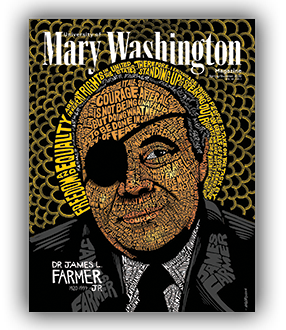By Emily Freehling
Charles Reed Jr. ’11 had never heard of James Farmer until, shortly after arriving on the University of Mary Washington campus, he registered for a first-year seminar about the life and legacy of the civil rights leader.
“I got my first introduction to who he was and how pivotal of a role player he was in the civil rights movement, founding CORE [the Congress of Racial Equality] and spearheading the Freedom Rides movement,” Reed said of the class, which was taught by Professor Timothy O’Donnell, now associate provost for academic engagement and student success.

Despite James Farmer’s enormous contributions to the struggle for civil rights in America, his isn’t a name many students learn as they go through the typical high school American history curriculum.
In the years since Farmer’s death in 1999, UMW faculty have sought ways to ensure that students don’t leave the school without an understanding of this man whose bust is displayed on Campus Walk and who is the namesake of the James Farmer Multicultural Center. Farmer taught at Mary Washington from 1985 until he retired as distinguished professor of history and American studies in 1998.
First-year seminars are classes of about 15 first-year students that help new students find their footing as they begin college-level work. F-sems, as they’re nicknamed, provide an opportunity for students to build a relationship with the instructor teaching the seminar.
“The idea is that they connect with that faculty member, so they feel that they are known. They matter to somebody,” said Professor of Classics, Philosophy, and Religious Studies Craig Vasey.
As co-director of the university’s race and gender curriculum development project, Vasey helped develop the F-sem that has introduced hundreds of Mary Washington students to Farmer’s role in history.
Called “Race and Revolution,” the multidisciplinary seminar has been taught over the years by faculty from many different departments, including mathematics, geography, English, sociology, and classics.
Professor of Mathematics Suzanne Sumner said she enjoys teaching the class from a leadership development perspective.
“The civil rights movement is an insightful case study on how to create change despite overwhelming obstacles,” she wrote in an email.
Sumner said many students, like Reed, come to Mary Washington unaware of Farmer and his contributions. UMW provides some information during student orientation, but the first-year seminar is a chance to take a deeper dive.
Often, students in the class will read Farmer’s autobiography, Lay Bare the Heart.
“One thing I always do is ask my students every week to look for articles about racial issues in the news and keep a log of those so that they can register how much these issues are in the news all the time,” Vasey said.
This presents an opportunity to show not only how relevant the civil rights movement continues to be, but also how much more there is to the story of history than what gets covered in high school.
“I think they are surprised at first. They are surprised that they don’t know his name, and they are surprised at how little they know about the civil rights movement,” Vasey said. “Many times, they are quite irritated to discover how little they learned about that aspect of our history.”
Sumner echoed that sentiment and added that the seminar energizes students to tell the story of James Farmer’s contributions to the American struggle for equality.
“By the end of the semester, students treat Dr. Farmer as ‘our’ civil rights leader, and they believe that Dr. Farmer’s legacy should be more broadly disseminated beyond UMW,” Sumner wrote.

